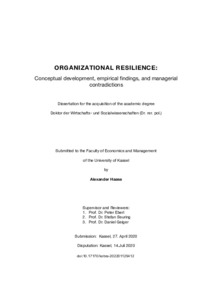| dcterms.abstract | Typical terms in organizational resilience definitions are maintenance of positive adjustment or bouncing back. They are very vague and need further specification if they are to be understood. At the beginning of my dissertation in 2016 there were hardly any comprehensive conceptual articles and review papers. Now, in 2020, there are some good conceptual articles (Darkow, 2019; Duchek, 2019; Linnenluecke, 2017; Williams et al., 2017) yet few empirical studies (van der Vegt, Essens, Wahlstrom, & Georg, 2015), which work against the development of a distinct concept by adding more and more factors, so that it is becoming harder to keep track of all factors that influence resilience. Thus, scholars increasingly refer to resilience as an umbrella concept (Darkow, 2019; Duchek, 2019; Klein, Nicholls, & Thomalla, 2003). Although resilience is a young topic in organization science, in other disciplines such as individual psychology (e.g. Cowen, 2001; Kaplan, 1999, 2005) or ecology (e.g. Bodin & Wiman, 2004; Carpenter, Walker, Anderies, & Abel, 2014), scholars seem to be avoiding the word owing to considerable conceptual blurring, calling into question the concept’s overall usefulness (Klein et al., 2003). Based on these aspects, two research objectives (ROs) arose that guided this dissertation from the outset:
RO1: From blurry definitions to a sound construct: Generating a resilience conceptualization that includes sequential differentiation and related capabilities.
RO2: What drives resilience? Identifying and categorizing the vast number of factors that influence resilience and that make up the umbrella construct. | eng |


